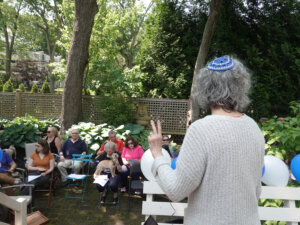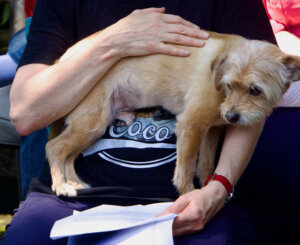Why I decided to give my dog a ‘bark mitzvah’ — a report from Coco’s coming-of-age ceremony
The ritual reminds us of the joy animals bring to people’s lives and the spiritual connection between man and beast

Coco, a 13-year-old terrier is called to the bimah on his big day. Photo by Thea Breite
BOSTON – The chairs were set up, the wine was chilling for the kiddush, and the homemade baked goods for the oneg ready to be served. The blue and white balloons were dancing expectantly in the breeze.
Then came the guests. Bessie. Joy. Bella. Lyla. Carl. Miggy. Lui. Daisy. A dozen dogs, plus their humans, although Kesem, a Maltipoo, couldn’t attend because of an injury. (He fell off the grooming table.) Mookie had a scheduling conflict, but sent a card extending best wishes on “your wonderful simcha!”
Coco, my 13-year-old terrier, was becoming a Bark Mitzvah.
He wore a yarmulke and a tallit, designed with scholarly precision by my sister Judy in Houston. Two rabbis officiated.
No doubt I’ve lost some readers by now. I can picture the eyes rolling, sense the disdain.
Bark Mitzvahs — and yes, there have been enough of them to merit a Wikipedia entry — have been derided by Jews more observant than myself as everything from the desecration of a sacred tradition to liberal-leaning Judaism run amok.
And it’s not only Jews who think it’s bonkers. “I don’t mind dogs getting together,” a dog-loving Christian friend told me before declining my invitation. “But I don’t see how you make it into a religious thing. This is way out there.”
Let me just say that there was a time when I, too, rolled my eyes at the anthropomorphizing of dogs — the hosting of dog weddings, the drop-ins at yappy hours — let alone a parody of a sacred Jewish coming-of-age ceremony.
And maybe if I didn’t feel so indebted to Coco, the barky rescue dog my son adopted for me after my husband died; or if I weren’t so dog tired of living under an oppressive blanket of pandemic anxiety and isolation, so hungry for some communal expression of giddiness and joy, I might feel the same way today.
But why not celebrate, Jewishly, the life of our loyal old dogs?

I took my inspiration from Rabbi Steve Gross of the Houston Congregation for Reform Judaism, who’s officiated at five Bark Mitzvahs in his temple’s parking lot since 2016, each drawing as many as 200 dogs. It was my sister who told me about it and persuaded me to come this year. I flew there from Boston, but the Bark Mitzvah was rained out and I couldn’t be there for the rain date.
Still, Gross was in good spirits when I met him at the synagogue that morning, even as the rain soaked the giant blue sparkly “BARK MITZVAH” sign on the lawn.
He explained the idea for a Bark Mitzvah was two-fold. “First, there is the slightly tongue-in-cheek playfulness that dog lovers have when their dogs become 13,” he said. “People would say to me, ‘I think it’s time for a Bark Mitzvah.’”
He’d also seen that Episcopal and Catholic churches he engaged with around the city designated a special day to bless animals. His synagogue has about 250 families, many with dogs, so it seemed like an auspicious place to host something similar, call it a Bark Mitzvah, and open it up to the wider community. He estimates about one-third of the pets are “non-Jewish dogs.”
“Oh my gosh, this is probably one of the most attended events in our entire congregation,” said Gross, who is currently dogless. “Two hundred people in my parking lot is more than I get on a Friday night.”
The event starts out with a short ceremony, Gross said, with “a recognition of the value dogs bring to us as human beings and a reminder of God’s creation in our lives every day.” There is a shehechiyanu celebrating the joy pets bring to humans’ lives, and a reading from the Book of Genesis about the day God created animals.
“It’s a way to generate community around a shared interest,” Gross said. “When people are in line to enjoy a cookie at the oneg after Shabbat, there’s a little bit of superficial conversation that takes place. At the Bark Mitzvah – and we could have called it the Jewish Day of Blessing Dogs, which is catchy, right? – what you see happen is what happens at dog parks all the time. Dogs, just like babies, open up a deeper level of conversation with total strangers.”
There is also a “mitzvah” component. The 40 or so vendors in the parking lot include animal rescue organizations and Animeals on Wheels, which delivers dog meals to Meals on Wheels clients so they don’t feel compelled to share their own food and resources with their pets.
This is also dog merch a-plenty – “Chewish” bone-shaped dog toys, pet-friendly flooring, a climate-controlled mobile dog gym equipped with treadmills. (“A mitzvah for the owners,” Gross said.)
He acknowledges he’s gotten pushback from some community members who consider a Bark Mitzvah disrespectful, even disgraceful. “They say we’re elevating dogs to the level of people. That dogs don’t have any halakhic authority.” But Gross pushes back on the pushback.
“You can be playful for Purim but not a Bark Mitzvah? Maybe they are not understanding that Bar Mitzvahs aren’t being made fun of. We are utilizing one term for something else; we do that all the time with Hebrew words,” he said, citing the only-in-Texas example of an event in Houston hosted by an Orthodox congregation. Meant for shul members who pack heat, it was called “Glocks & Bagels.” (He allows that “lox” isn’t Hebrew, but stands by his point.)

“I honestly think this is a beautiful way for us to celebrate our pets,” he said. “It elevates that love in a way that can be shared.”
The Bark Mitzvah eventually took place in April, though the numbers were a bit diminished — only about 100 dogs showed up — because of bad weather. Coco turned 13 in April, too, so back in Boston I began the preparations for his own Bark Mitzvah in my back yard.
Some of it came together easily — the Bark Mitzvah cake, the cookies shaped like bones and fire hydrants, the doggie bags, identifying a Mitzvah project to support, in this case Shultz’s Guest House, a local dog rescue shelter.
A bigger challenge was finding a rabbi who wouldn’t think I was unhinged. I reached out — apprehensively — to Rabbi Michael Swarttz of Beth Tikvah Synagogue in Westborough, Massachusetts; I’d met him years ago in my neighborhood dog park.
“I’m writing with what might seem like a bizarre question,” I emailed, re-introducing myself and outlining my plan.
“Your idea is not bizarre to me at all,” he wrote back. “I would love to participate. I have thought of trying to do one at my congregation.” Even better, his wife, Carol Glass, was also a rabbi and wanted to co-officiate. Both of them, I learned, later, thought of Bark Mitzvahs as a creative way to celebrate the bond between two species.
“I really believe that animals have a soul, as do all things that are alive,” Glass told me. “In terms of looking at God and my connection to Judaism, I’ve always had an impulse to dig into Judaism and broaden it, and make it more inclusive. Not to buy into the tradition that it can’t be malleable, or added to, or changed.”
We worked together on the flow of the service. Each dog was recognized by name. We sang, and listened to an old Cat Stevens number called “I Love My Dog.” Swarttz read a poem exalting dogs (“Dharma,” by U.S. Poet Laureate Billy Collins). Glass, a hospice chaplain and spiritual director, said a Mi Sheberach (prayer for healing) for Kesem and for “all pets in need/ so that they may know life and health, joy and peace.”
I’d been expecting chaos in my yard, but the animals all sat calmly with their humans and listened attentively to the rabbis, or so it seemed. This may have been the only barkless day in Coco’s life.
I spoke about my attachment to Coco and wished him, in Yiddish, a much longer life, biz hundert un tsvantsik. Until 120, canine hara.
Finally, we all threw dog treats, and yelled – what else? “Muzzle tov!”
























